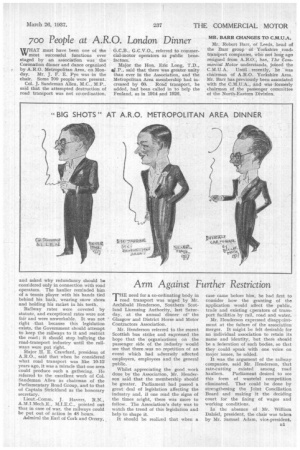Arm Against Further Restriction
Page 35

If you've noticed an error in this article please click here to report it so we can fix it.
THE need for a co-ordinating body in road transport was urged by Mr. Archibald Henderson, Southern Scotland Licensing Authority, last Saturday, at the annual dinner of" the Glasgow and District Horse and Motor Contractors Association.
Mr. Henderson referred to the recent Scottish bus strike and expressed the hope that the organizations on the passenger side of the industry would see that there -was no repetition of an event which had adversely affected employers, employees and the general public.
Whilst appreciating the good work done by the Association, Mr. Henderson said that the membership should be greater. Parliament had passed a great deal of legislation affecting the industry and, if one read -the signs of the times aright, there was more to follow. The Association's duty was to watch the trend of this legislation and help to shape it.
It should be realized that when a casecame before him, he had first to consider how the granting of the application would affect the public, trade and existing cperators of transport facilitias by rail, road and water.
Mr. Henderson expressed disappointment at the failure of the association merger. It might be felt desirable for an individual association to retain its name and identity, but there should be a federation of such bodies, so that they could speak with one voice on major issues, he added.
It was the argument of the railway companies, said Mr. Henderson, that rate-cutting existed among road hauliers. Parliament desired to see this form of wasteful competition eliminated. That could be done by strengthening the Joint Conciliation Board and making it the deciding court for the fixing of wages and working conditions.
Ia the absence of Mr. William Dalziel, president, the chair was taken by Mr. Samuel Adam, vice-president,




















































































